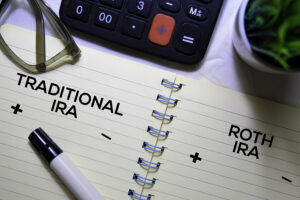Should you take advantage of a Roth 401(k)?
By Anne ZavagliaPosted on July 7th, 2021

If you have a 401(k) or other workplace retirement plan that offers a Roth option, you should consider taking advantage of it. Unlike pre-tax deferrals, contributions to a Roth 401(k) won’t reduce your tax bill now, but the withdrawals in retirement will be tax-free. If you expect to be in a higher tax bracket during retirement rather than now, a Roth 401(k) is the way to go.
How does it work?
Pre-tax salary deferrals go into a “traditional” 401(k), and after-tax money funds the Roth 401(k). You can choose to defer all or a portion of your 401(k) salary deferrals to Roth. The employer matching contributions will still go to a traditional pre-tax 401(k) account and will be taxable when withdrawn.
There is currently a proposal included in the Securing a Strong Retirement Act, dubbed SECURE Act 2.0, that would allow employer matching contributions to also be invested in a Roth 401(k). Whether or not this change becomes law is yet to be seen. It would certainly make Roth 401(k) contributions even more enticing.
Like Roth IRAs, withdrawals from a Roth 401(k) are penalty and tax free as long as you’ve had the Roth account for five years and are 59½ or older when withdrawals begin. Unlike Roth IRAs, RMDs are required from Roth 401(k) accounts starting at age 72 – unless the funds are rolled to a Roth IRA.
Larger Roth Contributions
Another big advantage to the Roth 401(k) is larger contributions limits. Participants can defer up to $19.5k (in 2021), plus an additional $6,500 if age 50 or over, to a Roth 401(k) – whereas contributions to a Roth IRA are limited to $6k per year ($7k if over age 50) and are subject to income limits.
With more money going to Roth, where investments grow tax-free, more of your money will be tax-free in the future.
Lower Tax Rates Now
With the uncertainty of future tax rates and today’s low tax rate environment, investing after-tax dollars now locks in today’s tax rate. Since you contribute after-tax dollars to a Roth 401(k), you’ve have paid the tax on that money at today’s rate. Unless something changes, current tax rates are set to expire after 2025. So even if your income stays the same – it will be subject to a higher tax rate.
Benefits of Tax-free Withdrawals
In retirement, withdrawals from a tax-deferred account will increase taxable income. The larger your tax-deferred accounts are, the higher your required minimum distributions will be. The bump in income can not only put you in a higher marginal tax bracket, it can affect how your Social Security benefits are taxed and the cost of Medicare premiums.
A Roth also gives you flexibility to take tax-free withdrawals for big expenses, such as home repairs, a car purchase, or medical bills. Because the withdrawals are tax-free, you won’t have to worry about increasing your taxable income for the year.